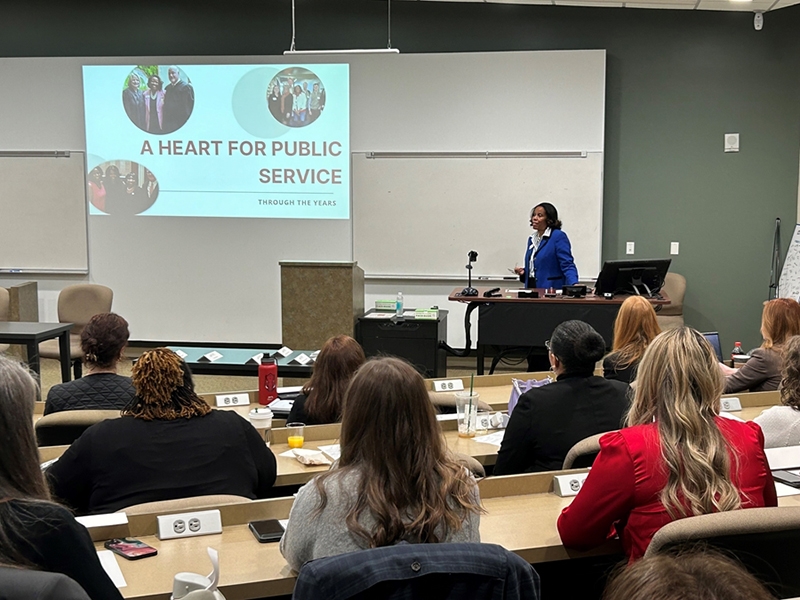The U of A School of Law welcomed the third class of the Arkansas Public Service Academy on Saturday, March 9. The Arkansas Bar Association and the U of A Clinton School of Public Service created the program to provide service-minded lawyers with the tools they need for service in both elected office and as volunteers.
Cynthia Nance, dean of the U of A School of Law, welcomed the class and academy members and spoke about her experience in public service, both as a volunteer and as dean and faculty member at the School of Law. She encouraged participants to be open to opportunities as they present themselves and to try new things.
The 2023-24 class of the Public Service Academy includes five students from the U of A law school: Jack Curtis, Lindsay Mast, Emma Parr, Victor Pulido-Rojas and Addison Tucker.
The class met March 8-9 in Fayetteville, gathering at Millar Lodge at Mount Sequoyah for a reception and the U of A for panels and workshops led by legal educators, current and former officeholders and others. The first part of their training was held January 19-20 in Little Rock.
The academy, chaired by Madhav Shroff and Skye Martin, is sponsored by the U of A School of Law, University of Arkansas at Little Rock William H. Bowen School of Law, Rose Law Firm, Arkansas Bar Association past-president Brian Rosenthal and the Appellate Law Section, Government Practice Section and Juvenile Justice and child Welfare Law Section of the Arkansas Bar Association.
Former Chief Justice Howard Brill, the Vincent Foster Professor of Legal Ethics and Professional Responsibility at the U of A School of Law; Circuit Judge Earnest Brown (J.D. '95); Arkansas House Speaker Matthew Shepherd (J.D. '01); and Michael Goswami (J.D. '15) and Nate Looney, co-chairs of the second Public Service Academy, serve on its steering committee.
About the University of Arkansas School of Law: The law school offers a competitive J.D. and is home to the nation's first LL.M. program in agriculture and food law. Led by nationally recognized faculty, the school offers students pro bono work, live client clinics, public service fellowships, competitions, and much more. Students also benefit from our location in one of the fastest growing, most livable, and economically vibrant regions in the U.S., and from our corporate externship partnerships with Fortune 500 companies. Our alumni have gone on to become judges, senators, and governors, and we serve communities throughout our state and nation through programs such as the Indigenous Food and Agriculture Initiative. Our longstanding commitment to diversity and inclusion is exemplified by the Six Pioneers, the first Black students to attend law school in the South. Follow us at @uarklaw.
Topics
Contacts
Erin Feller, director of development and external relations
School of Law
479-575-3468,
